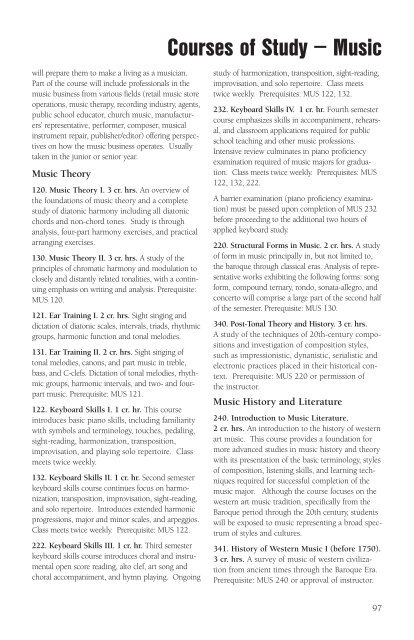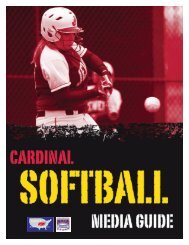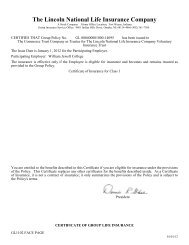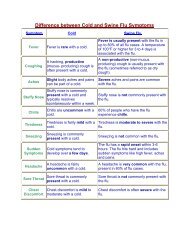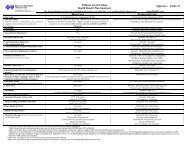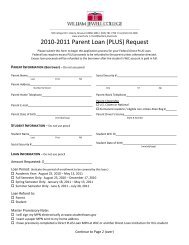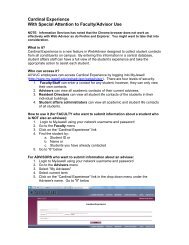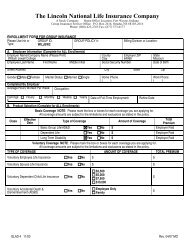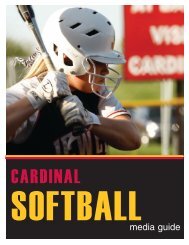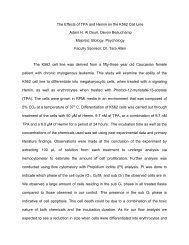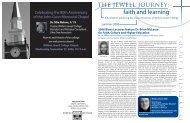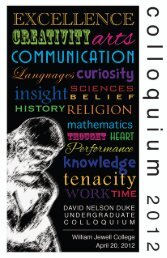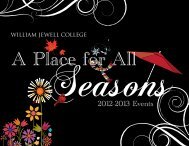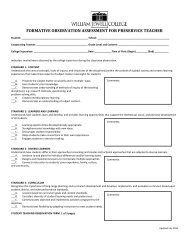Courses of Study - William Jewell College
Courses of Study - William Jewell College
Courses of Study - William Jewell College
You also want an ePaper? Increase the reach of your titles
YUMPU automatically turns print PDFs into web optimized ePapers that Google loves.
will prepare them to make a living as a musician.<br />
Part <strong>of</strong> the course will include pr<strong>of</strong>essionals in the<br />
music business from various fields (retail music store<br />
operations, music therapy, recording industry, agents,<br />
public school educator, church music, manufacturers’<br />
representative, performer, composer, musical<br />
instrument repair, publisher/editor) <strong>of</strong>fering perspectives<br />
on how the music business operates. Usually<br />
taken in the junior or senior year.<br />
Music Theory<br />
120. Music Theory I. 3 cr. hrs. An overview <strong>of</strong><br />
the foundations <strong>of</strong> music theory and a complete<br />
study <strong>of</strong> diatonic harmony including all diatonic<br />
chords and non-chord tones. <strong>Study</strong> is through<br />
analysis, four-part harmony exercises, and practical<br />
arranging exercises.<br />
130. Music Theory II. 3 cr. hrs. A study <strong>of</strong> the<br />
principles <strong>of</strong> chromatic harmony and modulation to<br />
closely and distantly related tonalities, with a continuing<br />
emphasis on writing and analysis. Prerequisite:<br />
MUS 120.<br />
121. Ear Training I. 2 cr. hrs. Sight singing and<br />
dictation <strong>of</strong> diatonic scales, intervals, triads, rhythmic<br />
groups, harmonic function and tonal melodies.<br />
131. Ear Training II. 2 cr. hrs. Sight singing <strong>of</strong><br />
tonal melodies, canons, and part music in treble,<br />
bass, and C-clefs. Dictation <strong>of</strong> tonal melodies, rhythmic<br />
groups, harmonic intervals, and two- and fourpart<br />
music. Prerequisite: MUS 121.<br />
122. Keyboard Skills I. 1 cr. hr. This course<br />
introduces basic piano skills, including familiarity<br />
with symbols and terminology, touches, pedaling,<br />
sight-reading, harmonization, transposition,<br />
improvisation, and playing solo repertoire. Class<br />
meets twice weekly.<br />
132. Keyboard Skills II. 1 cr. hr. Second semester<br />
keyboard skills course continues focus on harmonization,<br />
transposition, improvisation, sight-reading,<br />
and solo repertoire. Introduces extended harmonic<br />
progressions, major and minor scales, and arpeggios.<br />
Class meets twice weekly. Prerequisite: MUS 122.<br />
222. Keyboard Skills III. 1 cr. hr. Third semester<br />
keyboard skills course introduces choral and instrumental<br />
open score reading, alto clef, art song and<br />
choral accompaniment, and hymn playing. Ongoing<br />
<strong>Courses</strong> <strong>of</strong> <strong>Study</strong> – Music<br />
study <strong>of</strong> harmonization, transposition, sight-reading,<br />
improvisation, and solo repertoire. Class meets<br />
twice weekly. Prerequisites: MUS 122, 132.<br />
232. Keyboard Skills IV. 1 cr. hr. Fourth semester<br />
course emphasizes skills in accompaniment, rehearsal,<br />
and classroom applications required for public<br />
school teaching and other music pr<strong>of</strong>essions.<br />
Intensive review culminates in piano pr<strong>of</strong>iciency<br />
examination required <strong>of</strong> music majors for graduation.<br />
Class meets twice weekly. Prerequisites: MUS<br />
122, 132, 222.<br />
A barrier examination (piano pr<strong>of</strong>iciency examination)<br />
must be passed upon completion <strong>of</strong> MUS 232<br />
before proceeding to the additional two hours <strong>of</strong><br />
applied keyboard study.<br />
220. Structural Forms in Music. 2 cr. hrs. A study<br />
<strong>of</strong> form in music principally in, but not limited to,<br />
the baroque through classical eras. Analysis <strong>of</strong> representative<br />
works exhibiting the following forms: song<br />
form, compound ternary, rondo, sonata-allegro, and<br />
concerto will comprise a large part <strong>of</strong> the second half<br />
<strong>of</strong> the semester. Prerequisite: MUS 130.<br />
340. Post-Tonal Theory and History. 3 cr. hrs.<br />
A study <strong>of</strong> the techniques <strong>of</strong> 20th-century compositions<br />
and investigation <strong>of</strong> composition styles,<br />
such as impressionistic, dynanistic, serialistic and<br />
electronic practices placed in their historical context.<br />
Prerequisite: MUS 220 or permission <strong>of</strong><br />
the instructor.<br />
Music History and Literature<br />
240. Introduction to Music Literature.<br />
2 cr. hrs. An introduction to the history <strong>of</strong> western<br />
art music. This course provides a foundation for<br />
more advanced studies in music history and theory<br />
with its presentation <strong>of</strong> the basic terminology, styles<br />
<strong>of</strong> composition, listening skills, and learning techniques<br />
required for successful completion <strong>of</strong> the<br />
music major. Although the course focuses on the<br />
western art music tradition, specifically from the<br />
Baroque period through the 20th century, students<br />
will be exposed to music representing a broad spectrum<br />
<strong>of</strong> styles and cultures.<br />
341. History <strong>of</strong> Western Music I (before 1750).<br />
3 cr. hrs. A survey <strong>of</strong> music <strong>of</strong> western civilization<br />
from ancient times through the Baroque Era.<br />
Prerequisite: MUS 240 or approval <strong>of</strong> instructor.<br />
97


